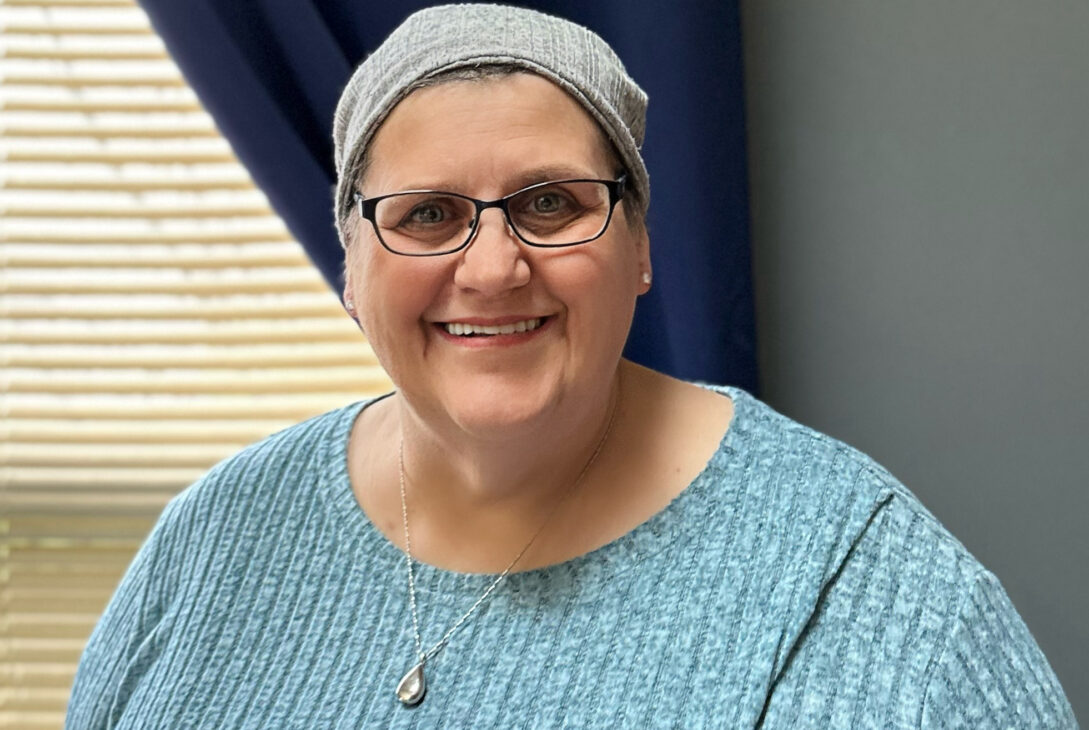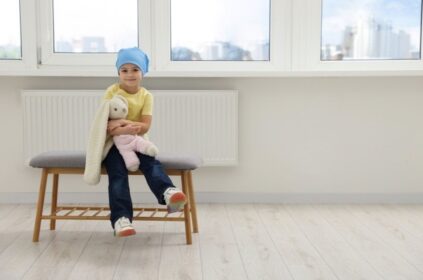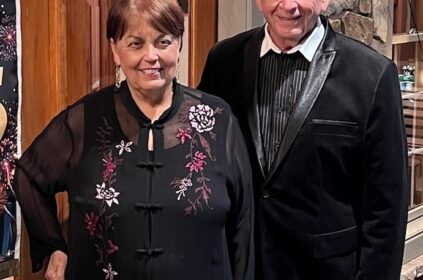Cancer. I never thought I would hear those words. I remember the exact date and time—it was 4:30 p.m. on August 14th. I was at the gynecologist’s office, and she was performing my exam. As she was finishing, she said, “I need to do a biopsy. I definitely see cancer in there, but we need to follow up with the tissue to make sure.” I was in shock and couldn’t fully process what she was telling me. She then performed the biopsy and said, “It’s endometrial cancer, or in other words, uterine cancer.” She added, “Well, if you’re going to get cancer, this is the best one to get. It’s the most treatable and the most survivable.” It didn’t matter what she said—I was so scared that I cried the entire time. She handed me a card with an oncologist’s name and number, telling me he was the best.
When I called the oncologist’s office, they made an appointment for me right away. I felt a sense of relief knowing that I already had a good doctor ready to take me as a patient. As I thought back on what had led me to this point, I realized I had been experiencing the classic symptoms. I had started having periods again, even though I was postmenopausal. At first, they were sporadic, then they became monthly, and eventually, I was bleeding every day without stopping. I had to wear multiple pads at a time and carry extra clothes with me just in case. The bleeding became so severe that I eventually had to go to the hospital. My gynecologist had advised me to go to a specific hospital where the oncologist worked if I couldn’t stop the bleeding. Following her advice and going to that hospital helped speed up the process of meeting the oncologist and starting treatment.
When the oncologist came to see me, he explained that his first priority was to stop the bleeding before addressing the cancer. I agreed, as I had already lost so much blood. I ended up needing a blood transfusion, and over time, I was given eight or more units of blood. To stop the bleeding, my cancer team decided to administer a first dose of chemotherapy, which worked, and the bleeding finally stopped. The next step was to determine if the cancer had spread. I had a CT scan the following day, and the results showed that the cancer had indeed spread. My cancer was now stage IV, having spread to my omentum and lungs.
I was more terrified than ever before and cried even more. When I was alone, I talked to all my angels in heaven, begging for this not to be true. I pleaded for the tumors to stop spreading and for the cancer not to be aggressive. Negativity consumed me, and I kept asking, “Why me?” I couldn’t stop thinking about the what-ifs, and I started planning for the worst in case I didn’t survive. My family’s significant history of pancreatic cancer haunted me. We had gone from a family of eight to a family of four, and many extended family members had also passed from cancer. With this history, my mind immediately associated cancer with death. I shut down, wallowed in bed, and cried constantly, feeling like no one could possibly understand what I was going through—or so I thought.
While I was in the hospital, wallowing and crying, not only did my family come to see me, but a few nurses and a social worker also shared their own journeys with cancer. Hearing their stories helped me feel less alone, but the person who helped me the most was a family friend who had battled cancer when she was younger. She truly understood how I felt and reassured me that I had a monster inside me that I needed to fight in order to survive.
“She reminded me that our greatest tool is our attitude and the will to fight. For some reason, her words resonated deeply with me and finally made me feel ready for battle.”
The moment that truly shifted my mindset was when my oldest niece came to visit. She looked at me with tears in her eyes and said, “I can’t lose you too.” I hugged her tightly and promised her that I would be okay, that I was going to fight, and that cancer wouldn’t know what hit it. The next day, when the doctor came to see me, he reassured me, saying, “We’ve got this. Don’t worry.” He explained that the team had decided chemotherapy would be the best course of action for me.

After completing chemotherapy, they repeated the scan, and the results showed that the tumors in my lungs were no longer detectable and the tumors in my omentum and uterus had shrunk. My doctor truly knew what he was doing. I was able to have surgery, during which they removed my uterus, fallopian tubes, ovaries, and omentum. I was incredibly fortunate—not just to have such an outstanding medical team, but also to have the best support system anyone could ask for.
My brothers and sisters were there for me every step of the way. They stayed with me in the hospital, took me to chemotherapy appointments, bought me anything I needed, and advocated for my healthcare. My nieces and nephews checked on me every single day, and one of my nieces even had a blanket made for me. My cousins prayed for me daily, my friends ran errands for me, and my family took care of my dog. It felt like I always had someone ready to help, no matter what I needed or when I needed it.
This has been one heck of a ride. I was diagnosed in August 2024 and had my surgery in February 2025. I went from being absolutely terrified to becoming a woman ready to fight anything. We all have our own stories to tell and our own journeys to walk through, but we share common ground and can learn so much from one another.
If I could share some words of wisdom with someone newly diagnosed, I would say this:
- Don’t be afraid to switch doctors if you are not comfortable with the care they are giving you.
- Be your own advocate and trust your gut.
- Stay positive because negativity only creates more problems.
- Remember, this is your journey, and you have the power to guide how you want it to go.
- Don’t be afraid to talk about it—there are others going through the same thing, and there are so many resources available if you just ask.
I still have a long journey ahead of me and continually work on staying positive. I have many hopes for my future. I hope this never comes back. I hope I can give back and help others who may need support throughout this process. I hope I can remain positive so the ugly negativity can finally be put to rest. I also hope to remind myself to be thankful every day for the family and friends I have, as they are the reason I’m here today. I will also continue hoping that a cure can be found for all cancers, so no one will have to suffer from it and loved ones won’t have to grieve the loss of someone they love.
Editor’s Note: Get Involved
Cancer doesn’t discriminate. WHATNEXT and its partners are interested in amplifying the voices of those from all identities and backgrounds. If you have a cancer journey to share, reach out here to learn more about how your voice can help spread awareness and inspire individuals from all walks of life.
cancer endometrial cancer patient stories
Last modified: May 2, 2025











